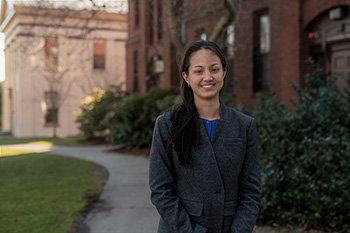
In recognition of her innovative and important contributions to the study of Mayan hieroglyphic writing, Mallory Matsumoto has been selected for a Joukowsky Outstanding Dissertation Award. This prize recognizes the superior research achievements of doctoral students.
“Her dissertation is a work of remarkable erudition and insight. It offers the most in-depth study to date of how knowledge was created and transmitted in the Classic Maya kingdoms of Mexico and Guatemala,” says Stephen Houston, Dupee Family Professor of Social Sciences
Matsumoto’s work explores how Mayan hieroglyphic writing was shared across the fragmented landscape during the Maya Classic period (AD 250-900), how the script was influenced by political and economic forces, and what the writing explains about the nature of written communication in Indigenous America. As the only fully developed script in the region, Mayan glyphs make for an excellent study of text transmittal during this time.
During her research she examined hundreds of sculptural monuments from across the Maya region of Mexico, Guatemala, Belize, and Honduras. She built a large database of glyphs that she then analyzed both qualitatively and quantitatively to reconstruct multiple transmission scenarios. Through this research, Matsumoto has shown that the variation in how scribes wrote reflects decentralized trajectories for exchanging hieroglyphic practice, or knowledge about the script and how to use it.
Her work proposes that the practice of writing on monuments ultimately reflects more similarity than difference because of scribes’ grounding in an intellectual culture that linked elites across the lowlands.
“Quite literally, this monumental undertaking is unparalleled in the study of the ancient Maya,” shares Andrew K. Scherer, Associate Professor of Anthropology and Archaeology, about Matsumoto’s work.
Scherer notes that Matsumoto’s “research is distinctly holistic. That is, she is not merely interested in the reading and decipherment of ancient Mayan languages but also understanding the evolution of Mayan writing within its social setting.”
Before coming to Brown, she earned master’s degrees from the University of Bonn and the University of Oxford and a bachelor’s from Cornell University. She has authored close to a dozen peer-reviewed articles with top journals, co-edited a special section of a journal, RES: Anthropology and Aesthetics, completed fieldwork in Mexico and Guatemala, and learned two indigenous languages, in addition to acquiring fluent reading of ancient Maya hieroglyphs.
She has also earned numerous fellowships during her time at Brown, including a Dumbarton Oaks Junior Fellowship in Precolumbian Studies, an Interdisciplinary Opportunity Fellowship with the John Carter Brown Library, an NSF Doctoral Dissertation Research Improvement Grant and a CLIR-Mellon Fellowship for Dissertation Research in Original Sources.
“The honor of being selected for the Joukowsky Dissertation Award is above all a testament to the opportunities that the Department of Anthropology and the Graduate School made possible for me during my studies at Brown and to the mentors, colleagues, family, and friends who have supported me throughout,” says Matsumoto.
Matsumoto has accepted a position as an Assistant Professor of Religious Studies at the University of Texas at Austin, starting Fall 2021.
Read more about the other Joukowsky Prize winners.